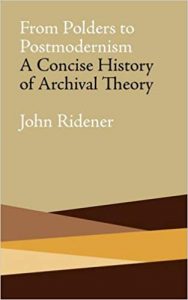From Polders to Postmodernism
A Concise History of Archival Theory
Author: John Ridener
Price: $45
Published: February 2009
ISBN: 978-0-9802004-5-4
208 Pages
Series on Archives, Archivists and SocietyThis book is number 3 in the Series on Archives, Archivists, and Society, Richard J. Cox, editor
From Polders to Postmodernism is a broad ranging history of the conception and development of the theories that have guided archivists in their work from the late 19th through the early 21st centuries. Narrated through the controversial thread of archival appraisal theory, the book examines how archivists have engaged with theory through the tension between keeping records that reflect objective history “as it happened” and subjective decision making in the archive. Through an interpretive reading of archival theory, distinct periods emerge, with each paradigm contributing unique responses to difficult archival, historical, and theoretical contexts.
The book is written within the framework of paradigm change and discusses archival theory in terms of geographical, historical, historiographical, and technological contexts. Through these contexts and discussion of luminary archival theories, the development of distinct periods within archival theory is illustrated. The periods and associated archivists include: Consolidation (Muller, Feith, and Fruin’s Manual for the Arrangement and Description of Archives), Reinforcement (Jenkinson’s A Manual of Archive Administration), Modern (Schellenberg’s Modern Archives), and Questioning (the work of five archivists: Brothman, Cook, Heald, Ketelaar, and MacNeil from 1991 to 2004).
Read Richard J. Cox’s review of From Polders to Postmodernism.
